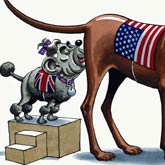
Comments »WASHINGTON – A Depression doesn’t have to be Great — bread lines, rampant unemployment, a wipeout in the stock market. The economy can sink into a milder depression, the kind spelled with a lowercase “d.”
And it may be happening now.
The trouble is, unlike recessions, which are easy to define, there are no firm rules for what makes a depression. Everyone at least seems to agree there hasn’t been one since the epic hardship of the 1930s.
But with each new hard-times headline, most recently an alarming economic contraction of 6.2 percent in the fourth quarter, it seems more likely that the next depression is on its way.
“We’re probably in a depression now. But it’s not going to be acknowledged until years go by. Because you have to see it behind you,” said Peter Morici, a business professor at the University of Maryland.
No one disputes that the current economic downturn qualifies as a recession. Recessions have two handy definitions, both in effect now — two straight quarters of economic contraction, or when the National Bureau of Economic Research makes the call.
Declaring a depression is much trickier.
By one definition, it’s a downturn of three years or more with a 10 percent drop in economic output and unemployment above 10 percent. The current downturn doesn’t qualify yet: 15 months old and 7.6 percent unemployment. But both unemployment and the 6.2 percent contraction for late last year could easily worsen.
Another definition says a depression is a sustained recession during which the populace has to dispose of tangible assets to pay for everyday living. For some families, that’s happening now.
Morici says a depression is a recession that “does not self-correct” because of fundamental structural problems in the economy, such as broken banks or a huge trade deficit.
Or maybe a depression is whatever corporate America says it is. Tony James, president of private equity firm Blackstone, called this downturn a depression during an earnings conference call last week.
The Great Depression retains the heavyweight crown. Unemployment peaked at more than 25 percent. From 1929 to 1933, the economy shrank 27 percent. The stock market lost 90 percent of its value from boom to bust.
And while last year in the stock market was the worst since 1931, the Dow Jones industrials would have to fall about 5,000 more points to approach what happened in the Depression.

